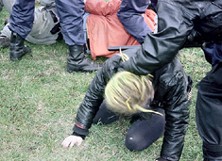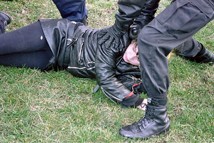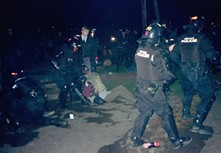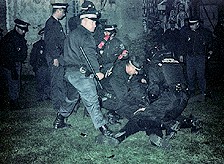I cannot become a victim of police brutality, because I am an orderly citizen.
I do not think it is the normal practice of the Czech police to catch innocent bystanders and drag them away in handcuffs to be tortured. Unlike Comrade Mach, I live permanently in this country. Occasionally, my friends and I are a little rowdy when returning from the pub, but I have not been in prison yet.
The above is from a letter by a reader of the Czech Internet daily Britské listy, reacting to the startling testimony of American art student Sylvia Yolanda Mach, who was arrested during the September anti-globalisation demonstrations in Prague while filming in an empty schoolyard, detained without charge, brutalised and then accused of crimes for which there is no convincing evidence. Mach jumped out of a first floor window during a police interrogation, injuring her spine and her leg and, though seriously wounded, was then subjected to hostile treatment, bordering on torture, in a Prague hospital.
As we have reported before in this column, the Czech police reacted to September's anti-globalisation demonstrations surrounding the IMF/World Bank summit in Prague with large-scale, arbitrary detentions of people and with brutal and illegal practices directed against many of those detained.
From a public relations point of view, however, within the Czech Republic, the police action was an almost complete success: the Czech media supported the police unquestioningly, interpreting the anti-globalisation demonstrations as an onslaught of degenerate, foreign marauders against the symbol of Czech nationhood, the "beautiful capital of Prague." In the view of the Czech media, the "foreign degenerates were successfully subdued by chivalrous members of the Czech police, our lads."
The fact that numerous provisions of Czech law were blatantly ignored was passed over.
President Havel and the mounting evidence of police brutality
The impact of the propaganda was so strong that even President Havel succumbed to it, publicly thanking the police for their good work. When asked by the Prague daily Lidové noviny some weeks ago what he thought of the large numbers of protest letters alleging police brutality, Havel said that he did not bother reading these protest letters.
Over the past few weeks, however, evidence has been mounting that the police action against the anti-globalisation demonstrations was seriously flawed.
As a result of this, the President's Office has now published a mildly defensive statement relating to the controversy. Havel reiterates that it was right for him to thank the police. In Havel's view, the anti-globalisation demonstrations must be rejected, because they were marred by violence. (It is perhaps regrettable that Václav Havel does not distinguish between tens of thousands of peaceful demonstrators and a few dozen perpetrators of violent acts.)
However, Havel now says that "if some excesses were committed, they must be investigated." He does not express a view on how this ought to be done.
Britské listy has learned that of 320 registered protests against the Czech police, the Inspectorate of the Czech Interior Ministry is investigating only a handful. It would appear that most of the complaints have been handed over to the individual police stations to be dealt with there.
Havel admits in the statement, issued by his Office at the end of last week, that he has pardoned a 16-year old Austrian, who had broken wipers off two cars in Prague during the demonstrations. Again, Havel makes no comment on the fact that this juvenile was held in custody for more than a month for causing damage worth less than USD 200.
Havel also has not reacted in any way to harrowing reports which are now finally appearing in the Czech mainstream press.
On Friday 10 November, Lidové noviny published an account of an 18-year-old Danish boy who could be sentenced to up to ten years' imprisonment in the Czech Republic for allegedly attacking and injuring policemen during the demonstrations. The accusations are based solely on police testimony.
The Danish boy, Mads Traerup—whose case has been the centre of media attention in Denmark—says, however, that he did not attack any policemen, but, on the

|
As Lidové noviny reports, the Czech authorities refuse to talk to Traerup's despairing parents who have arrived in the Czech Republic looking for help and who have lodged an application for pardon with Havel's Office. They would like their son to be transferred to a Danish prison, as they are shocked by the conditions prevailing in Czech prisons. Mads Traerup is allowed to wash only once a week and is entitled to receive a parcel only once a month.
Ignoring the law
The September police action was successful, and so we will now use it everywhere.
There is worrying evidence that the Czech authorities are trying to use the "successful policing methods" of the September anti-globalisation demonstrations as a model for the future.
 |
| An officer subdues a demonstrator who tried to block the departure of a removal van |
In the views of Jan Křeček, the lawyer representing the Ladronka Civic Association, the police action was illegal primarily because the squatters, who had lived in the dilapidated property for seven years and had partially refurbished it, had a lease agreement with the owners of the property. The estate agents Trade Center Praha had decided to end the agreement, but the case went to court, and the court has not yet given its verdict on the matter.
 |
| From the other side |
The action against the Ladronka squat was taken by the Prague Municipal Police. On Thursday 9 November at 7 o'clock in the morning, of the nine individuals present in the squat, four were detained and handed over to the regular (national) police for the alleged criminal offence of theft (it is claimed there was an illegal connection to the electricity mains in the building). Four inhabitants of Ladronka escaped onto the roof, and a stand-off ensued. The Municipal Police did not allow the hold-outs' friends to pass warm clothing to them—with the temperature around zero Centigrade—and after ten hours of protest, the frozen squatters gave up and climbed down.
The problem is that, according to the Czech Law on Community Police, the powers of members of municipal and community "police forces," run by the local authorities, are strictly limited to dealing with minor offences.
 |
| Punishment for making a fire: officers drag a randomly selected demonstrator behind the police line |
Furthermore, the squatters' property was confiscated without any police record being compiled, and without any official court order, the police broke in to the squat and showed journalists around the squatters' rooms.
In the evening of Thursday 9 November, the police action drew to a close. The demonstrators were cold, and so they lit fires in front of the Ladronka estate (starting an open fire is a minor offence). The municipal riot police squad attacked them twice, kicking and beating them with truncheons.
 |
| This is how the second victim ended up |
The commander of the Municipal Police, Radim Chyba, could not explain to Britské listy what law the police were acting under to prevent the squatters on the roof from being given food and warm clothing. It was very cold, and there was a real danger that the frozen squatters might not be able to hold on and could fall off the steep roof.
Property owners naturally have the right to move out squatters, but in a legal state, surely they must do so using procedures which are based upon the law. If a society is to develop constructively, it must give space to the controversial views and actions of its citizens, naturally, within the limits of the law; it must not use illegal and inhuman policing methods against them. It is disturbing that many people in the Czech Republic do not, as yet, seem to realise this.
It is even more disturbing that the brutal police action against anti-globalisation demonstrators in September no longer seems to be a one-off occurrence but rather part of an ingrained police culture in the Czech Republic.
Jan Čulík, 12 November 2000
Photographs courtesy of Britské listy
Moving on:
- The startling testimony of American art student Sylvia Yolanda Mach
- Archive of Jan Čulík's articles in CER
- Browse through the CER eBookstore for electronic books
- Buy English-language books on the Czech Republic through CER
- Return to CER front page



